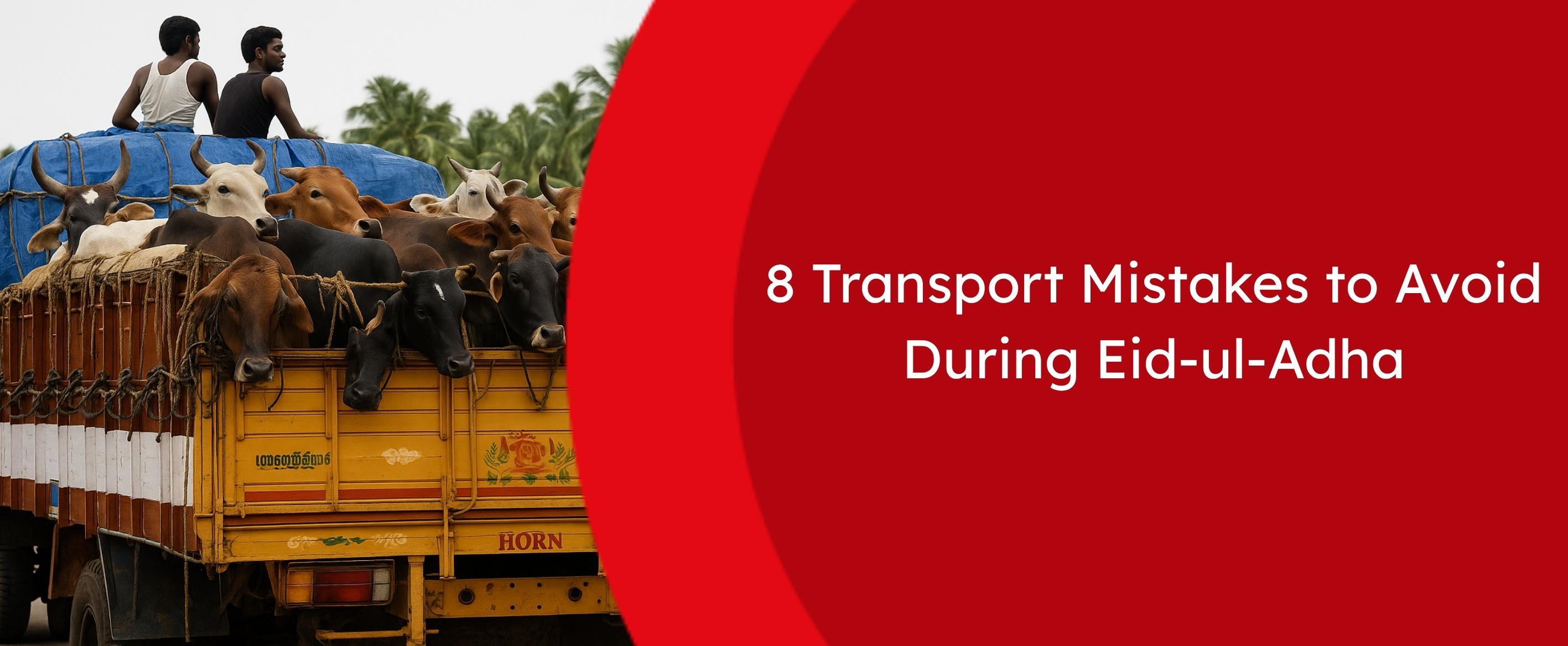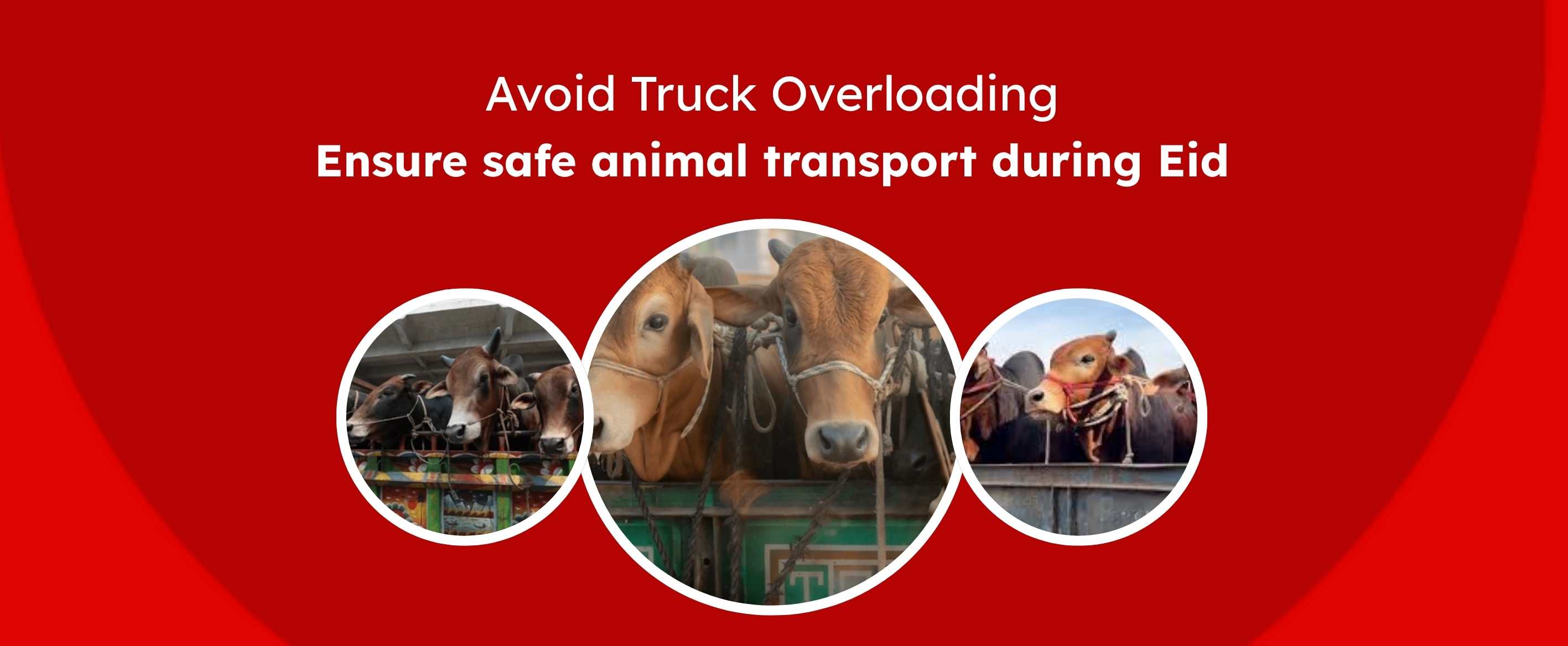
Avoid Mistakes in Sacrificial Animal Transportation: Be Aware, Stay Safe
- On June 04, 2025
Eid-ul-Adha is a sacred and significant religious festival in Islam, embodying the spirit of sacrifice and devotion. Leading up to this auspicious occasion, a massive operation of transporting Sacrificial animals takes place across the country, from remote areas to urban centers. However, during this noble endeavor, certain common mistakes and oversights in the transportation system can lead to various difficulties, unexpected accidents, and even serious legal complications. Therefore, it is imperative to exercise utmost caution and adhere to government-mandated regulations when transporting animals during this special time. Ensuring safe and proper animal transportation is both our ethical and religious responsibility.
In this detailed blog, we will thoroughly analyze the common mistakes that occur during Sacrificial animal transportation and discuss practical and effective ways to avoid them. The primary goal of this blog is to ensure that every Sacrificial animal reaches its destination safely and in good health, and that the joy of this sacred festival does not become a source of suffering for any animal.
- Beware of Unauthorized Transportation Systems: During Eid-ul-Adha, due to high demand, unauthorized or unregistered transportation systems are often used to transport animals quickly and at a lower cost. Furthermore, animals are sometimes transported carelessly without proper documentation or permits, which is a serious offense under the country's prevailing laws. Such unauthorized transportation systems significantly increase the safety risks for the animals.
Awareness and Actions:
- Use Designated Transportation: Choose transportation systems that are designated and licensed by the government for animal transport. These vehicles ensure specific load capacities and safety standards.
- Traffic Police Directives: Always follow the directives of the traffic police on the road. Adhering to their instructions can help avoid unforeseen troubles and make the journey smoother.
- Utilize Digital Platforms: Use online platforms like Truck Lagbe, where all trucks and drivers are registered and verified. This reduces the risk of using unauthorized transport.
- Avoid Overloading Animals: Driven by the desire for quick profit or to save time, many traders or transporters load an excessive number of animals onto a single truck, beyond its capacity. As a result, the animals lack sufficient space to move, leading to severe injuries due to overcrowding. Excessive pressure, lack of oxygen, and high temperatures can cause heatstroke, and in extreme cases, even lead to suffocation and death of the animals. This is extremely inhumane for the animals and can result in significant financial losses for the seller.
Awareness and Actions:
- Load According to Truck Capacity: Load a specific number of animals according to the truck's designated capacity. The Truck Lagbe app clearly states the truck's load capacity, which will help you make the right decision.
- Ensure Sufficient Space: Ensure adequate space for each animal in the truck so they can stand, sit, and move slightly with comfort.
- Select Truck Based on Animal Type: Determine the number of animals per truck based on the size of the cows. The number applicable for smaller cows will be different for larger ones.
- Ensure Food and Water Provision for Long Journeys: During long journeys, if animals are transported without the necessary food and water, they can suffer from severe dehydration. This rapidly weakens their bodies, reduces their immunity, and significantly increases their risk of contracting various diseases. Furthermore, sick or weak animals have reduced market demand, leading to financial losses for the seller.
Awareness and Actions:
- Adequate Water and Easily Digestible Food: Before and during the journey, provide animals with sufficient clean water and easily digestible food (such as fresh grass, hay) during breaks.
- Planned Stops: For long journeys, plan for regular stops at specific distances where animals can rest and be provided with food and water.
- Maintain Hydration: Especially in hot weather, try to maintain the animals' hydration by sprinkling water on their bodies or covering them with wet sacks.
- Pay Attention to Shade and Air Circulation: On hot days or under intense sun, if animals are kept in trucks lacking shade and proper air circulation, they suffer immensely from excessive heat. This can lead to heatstroke and respiratory distress, endangering the animals' lives. In enclosed environments without sufficient airflow, animals can quickly develop breathing difficulties.
Awareness and Actions:
- Provide Shade: Arrange for a canopy or covering on the truck to protect animals from direct sunlight and provide adequate shade.
- Ensure Air Circulation: Choose transportation systems that ensure good air circulation. If necessary, arrange for additional ventilation or air inlets in the truck.
- Avoid Daytime Heat: Avoid traveling during the hottest parts of the day when temperatures are high. Starting the journey in the early morning or after sunset can significantly reduce the animals' discomfort.
- Treat Animals Humanely: Animals are often controlled by tying them with tight ropes around their legs or necks and pulling them, or by inflicting cruel blows. This is not only inhumane but also extremely risky for the animals, causing severe physical harm. Such treatment increases the animals' stress and frightens them.
Awareness and Actions:
- Be Compassionate: Always treat animals with compassion and humanity. Remember, they are living beings and feel pain.
- Experienced Handlers: Seek assistance from experienced handlers for loading and unloading animals from the truck. They are knowledgeable about animal anatomy and behavior and can minimize the risk of injury.
- Humane Control Methods: Adopt safe and humane methods for controlling animals. Use soft ropes or belts if necessary, and avoid applying excessive pressure on the animal's neck.
- Reduce Traffic Jams and Accident Risks During Eid-ul-Adha, the number of animal-carrying vehicles on the roads significantly increases. During this time, reckless driving, non-adherence to traffic laws and regulations, and especially driving at excessive speeds or without sufficient rest at night, greatly increase the likelihood of accidents. An accident poses a serious risk not only to the animals but also to the driver, helper, and pedestrians.
Awareness and Actions:
- Experienced Drivers: Employ experienced and responsible drivers for animal transportation who have long-haul driving experience and a clear understanding of traffic laws.
- Adhere to Traffic Laws: Instruct drivers and helpers to strictly follow traffic laws and road safety regulations.
- Travel in Daylight: If possible, try to travel during daylight hours. Visibility is reduced at night, increasing the risk of accidents. If nighttime travel is planned, advise on adequate lighting and slow driving.
- Advance Planning: Plan your routes in advance to avoid congested areas. The Truck Lagbe app allows you to book a truck two days in advance and plan the route effectively with the driver, which can help avoid traffic jams.
- Proper Truck Selection and Digital Assistance: Choosing a truck that is not compatible with the animal's weight and type complicates the transportation process. For example, putting too many animals in a small truck or using a covered van without sufficient air circulation.
Awareness and Actions:
- Truck Size by Animal Weight: Determine the truck's size based on the weight and number of Sacrificial animals. The Truck Lagbe app offers various truck options, including pickup trucks, 1 ton truck, 2 ton truck, 3 ton truck, and even big trucks with up to 15 ton truck capacity. Various types of trucks like Tata pickup, Toyota pickup, Isuzu pickup, Mahindra Bolero pickup, and Ashok Leyland truck are available.
- Fare Calculation by Distance: Calculate the fare based on the distance. The Truck Lagbe app provides an upfront fare estimate, which helps with budget planning. For longer distances, sending more goods at once can be more profitable, so advance planning is crucial.
- Choose the Right Logistics Company: Select a reliable logistics company like Truck Lagbe, which is experienced in animal transportation and maintains all necessary safety standards.
- Preparation for Emergencies: No amount of preparation is enough for unexpected events. For instance, if the truck breaks down on the way or if there's a health issue with an animal, a lack of prior preparation can lead to significant losses.
Awareness and Actions:
- Communication System: Keep necessary contact numbers handy for emergency communication with the driver and the logistics company.
- Alternative Arrangements: Consider if alternative transportation can be quickly arranged in case of major problems. Truck Lagbe's extensive network can help find quick alternatives in such situations.
- Minor Repairs: Ensure that the truck is accompanied by necessary tools for minor repairs and a skilled helper.
Awareness and responsible conduct during Sacrificial animal transportation are crucial not only for the welfare of the animals but also for pedestrians, passengers, drivers, and the environment as a whole. It is our collective responsibility to act humanely and in an environmentally friendly manner while fulfilling our religious duties. Digital platforms, especially Truck Lagbe, have made this process much easier, more transparent, and reliable. All types of trucks, from pickup trucks to big trucks, are readily available, making your truck selection more effective according to your needs.
Categories
Recent Posts
- ENJOY UP TO TK1,250 DISCOUNT (4%) BY USING PROMO CODE: CARRY25
- ENJOY UP TO TK 1,500 DISCOUNT (4%) BY USING PROMO CODE: BIGMOVE25
- How Mr. Afzal Unlocked Great Profit With Truck Lagbe’s 18 Feet Truck Feature!
- How to Book a Shifting Service Using the Truck Lagbe App
- ENJOY 5% DISCOUNT (UP TO ৳500) BY USING PROMO CODE: DARUN25
4 Reasons Why You Should Avoid the Risk of Overloaded Trucks for Sacrificial Animal Transportation

Why You Should Book a Truck in Advance During Eid's Busy Season


